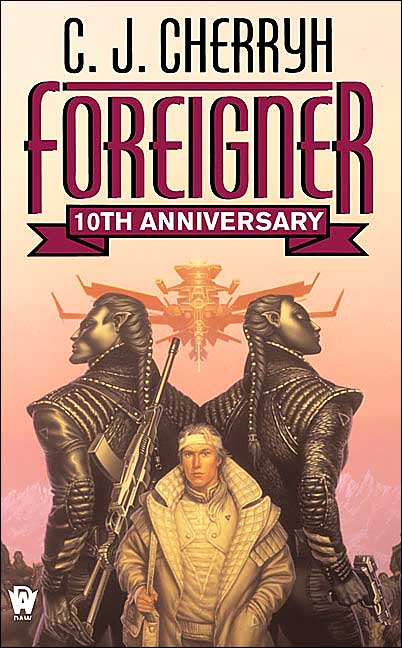I’m re-reading Cherryh’s Atevi series in preparation for the new one, volume 11, Deceiver, which is due out next week. I re-read all of them when there were nine of them and did an overview post but this time I’m going to be looking at them one by one.
This is an open series, by which I mean that each volume is relatively self-contained but leads on to the next. You never get half a book, but they are all part of the same thing. They also fall into trilogies, which means that every third book has even more of the conclusion nature—that’s true of the first six anyway. What they tend to do more than conclude is open up at the ends, which works pretty well for being satisfying. However, it would be a terrible idea to start reading them anywhere but in the beginning. They occasionally make a faint concession to catching you up, but really it’s not much more than a reminder. You need to read these books in order and from the beginning, and that means starting with Foreigner.
Spoilers for Foreigner only.
Foreigner is a book that doesn’t do itself any favours. Even though I like these books a lot and have read them all multiple times, I find the beginning of Foreigner offputting. It starts with two “books” of background, comprising about seventy pages total. Phoenix is a ship from Earth, off to found a new spacestation, that gets lost in hyperspace and finds itself somewhere dangerous, utterly unknown, and in another universe as far as anyone can tell. So far so good, I’d be delighted to read a Cherryh novel about these characters and this problem, but then suddenly you’re a hundred years in the future and their descendants are going down onto the habitable and inhabited planet and meeting the aliens. OK, well, I’ll happily read a first contact story either—but then with another jerk we’re a hundred and fifty years later still. The humans are all on an island and relations with the alien Atevi are touchy to say the least, and Bred Cameron, the translator, is being shot at. The Atevi are fascinating. Bren Cameron’s problems are immediately overwhelming. But is it safe to start to care about them? Well, it is, as you’re going to be with Bren for the next ten volumes at least, but it always strikes me as an unnecessarily bumpy beginning.
The “foreigner” in Foreigner is of course Bren Cameron himself, the paidhi, ambassador-interpreter, the only human on the Atevi side of the strait, foreign to the Atevi, to the planet (although humans have been there for a hundred and fifty years) and perhaps even to the universe. Throughout the book Bren feels foreign in the widest sense, and the Atevi feel foreign to him. Even though he speaks their language he never quite knows where he is with them.
Going right back to the beginning like this, it’s startling how helpless Bren is and how uncomfortable he is with the Atevi. There’s a general pattern in the series for antagonists to become friends—if I can use that word—in later volumes, but in this one Bren doesn’t have any friends, can’t trust anyone, is isolated, surrounded and poisoned by tea. It’s difficult to read—I can never face reading it if I’m ill, because of the poisoned tea. This is the introduction to the Atevi, and at this point I know so much more about them than Bren sees, sometimes even about the individuals, that it reads oddly. With Ilisidi, and especially with Jago and Banichi, I can’t really engage with them any more as dangerous and potentially treacherous in the way this volume requires. I was also looking out for any clues as to Algini’s nature as revealed later, and found absolutely nothing.
What’s brilliant is the creation of a whole alien species that has been getting human tech handed to them slowly over a hundred and fifty years, while staying separate and distinct. We see their hierarchical nature, especially as illustrated through the mechieti. We see Bren’s problems with wanting to like them and wanting to be liked. He isn’t yet the person he becomes. He’s very young and unsure and much less fluent—and we see him reading human catalogs to stay human. The best bits are to do with Bren’s discovery of Atevi culture—the wikitiin, the guest book at Malguri, and the conversations with Jago about heretics who thought you were supposed to associate with everyone.
The plot of Foreigner is that the Phoenix has come back and the presence of the ship in the sky is stirring everything up. But Bren doesn’t learn that it’s there until almost the end—this is the excellent opening out ending. Bren spends the book being tested and confused about what is going on, tested to the point of torture, because the Atevi suddenly can’t trust the humans and he is the only one within reach. We don’t see anything of Mospheira, the ship is nothing but a point of light, the book is entirely planet-bound and concerned with the planet and the Atevi.
I like these books much better once Bren gets his feet under him and space starts to be in the equation. The first time I read Foreigner, fifteen years or so ago, I wasn’t at all sure about it and I certainly couldn’t have imagined how eager I’d be for book 11. The series has definitely grown on me, and I think the series really does get better and more enjoyable as it goes on.
Jo Walton is a science fiction and fantasy writer. She’s published eight novels, most recently Half a Crown and Lifelode, and two poetry collections. She reads a lot, and blogs about it here regularly. She comes from Wales but lives in Montreal where the food and books are more varied.










